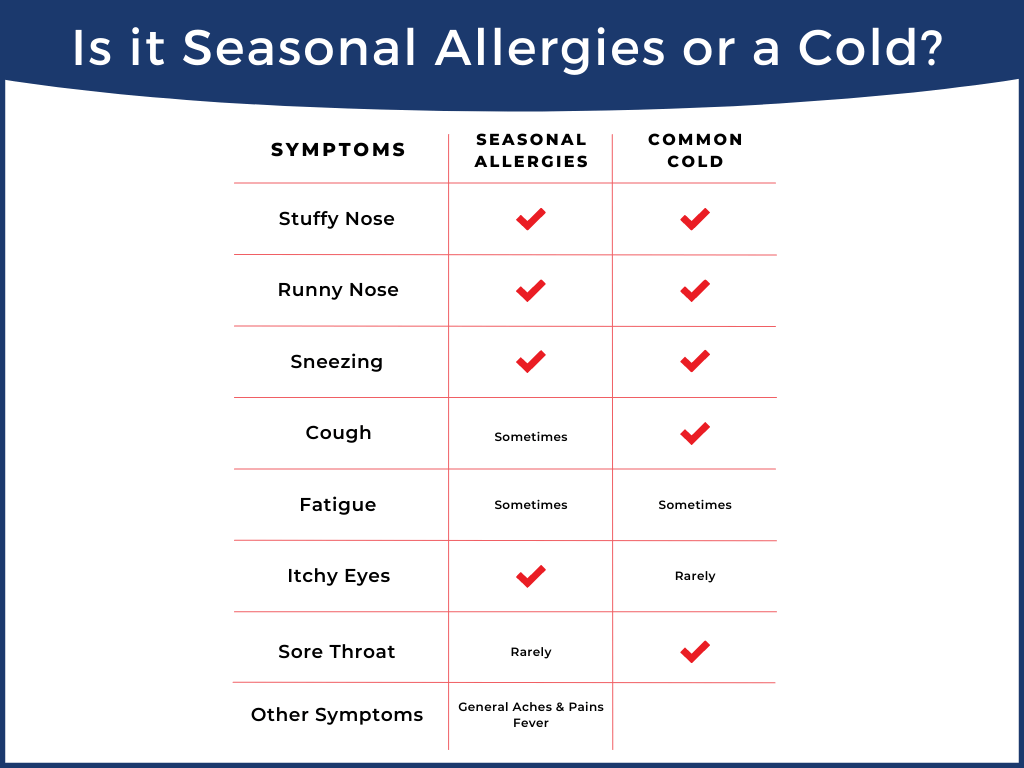
One fades in days—the other lingers until the trigger goes away
You start sneezing. Your nose runs. Maybe you’re tired. But is it a cold? Or are you reacting to something in the air? The first sign is timing. Colds come on fast. They peak. Then ease within a week or so. Allergies don’t follow that path. They persist. They stretch into weeks—sometimes months—if the trigger stays.
You might treat both with the same over-the-counter meds. But only one actually fades on its own. If your symptoms return every spring—or every time you visit a certain place—it’s not a cold. It’s your immune system overreacting.
Knowing how long you’ve been sick is the first clue.
Colds often come with body aches and fevers—allergies don’t
Viruses affect the whole body. You feel worn out. Sore. Achy. Sometimes chilled. Occasionally feverish. Allergies don’t do that. They stay in your upper airways. Your eyes. Your nose. Your throat. They don’t raise your temperature. They don’t cause joint pain.
If your head feels foggy, but your body feels fine—it’s probably allergies. If you feel like sleeping for days, it might be a cold.
Your body tells the difference, even if your nose doesn’t.
Mucus color doesn’t always mean what you think
Colds often bring thick, yellow or green mucus. That’s a sign your immune system is fighting a virus. Allergies usually cause clear, watery drainage. A constant drip. A need to blow your nose, even when nothing comes out.
But mucus can change. Especially if allergies cause irritation. Or if a cold triggers an allergic flare. That’s why color helps—but doesn’t decide.
Look at the pattern. Look at how it started. Look at what else came with it.
Itchy eyes are a strong allergy signal
Colds make you tired, but allergies make you itch. Especially around the eyes. Redness. Burning. Watering that won’t stop. That’s not viral. That’s histamine.
If your eyes are the worst part of your symptoms, think allergies first. Especially if you’ve had it happen before. Especially if it happens outside. Or during pollen season.
Itchy eyes rarely come with colds. That’s what makes them useful.
Coughs feel different depending on the cause
Colds bring a deep, chesty cough. Mucus builds. Drips down. Gets stuck. Allergies bring a dry, persistent cough. One that tickles. That doesn’t bring anything up. It’s more annoying than painful. And it lasts.
Both can make you clear your throat. Both can feel worse at night. But if your cough sticks around long after your other symptoms are gone—it’s more likely from allergies.
Or from post-nasal drip that won’t stop.
Season and setting offer important clues
Colds don’t care where you are. Or what’s blooming outside. They spread person to person. If your symptoms started after someone near you got sick—it’s likely a cold.
But if you notice symptoms only when you’re in certain rooms—or during certain times of year—that’s different. Maybe it’s dust. Maybe mold. Maybe pollen. Maybe pets. Allergies show up with your environment.
That pattern is what separates them from infections.
Medications offer temporary clues—but not always certainty
Antihistamines ease allergy symptoms quickly. Within hours. Decongestants help both colds and allergies—but they don’t solve either. If your symptoms disappear after one allergy pill, that’s a hint. But not a diagnosis.
Cold medicine can dull symptoms—but doesn’t make them vanish immediately. If it feels like something is still lingering days later, you may be dealing with more than a virus.
What works gives insight. But only when paired with the bigger picture.
Allergies come back again and again—colds don’t
You recover from a cold. It goes away. Then you move on. Allergies aren’t like that. They return. They flare. The same time every year. The same trigger every time.
If you’ve had the same symptoms each spring for years—it’s not coincidence. If you always feel worse around animals or dust—it’s not a cold. It’s your immune system reacting. Again.
Allergies are repeat offenders. That’s how they reveal themselves.
Kids often show both—but still follow the same rules
Children can have allergies. Or colds. Or both. But the same differences apply. Colds cause fatigue, fever, and crankiness. Allergies bring itchy eyes, frequent sneezing, and clear runny noses.
If your child has the same symptoms every season, it’s worth talking to a doctor. Especially if over-the-counter medications help only briefly—or not at all.
Allergy testing might clarify what’s going on. Or offer a way forward that doesn’t involve constant guesswork.
When in doubt, watch the pattern—not just the symptoms
The most helpful clue isn’t how you feel today. It’s what’s happened before. Has this happened before? Around the same time? In the same place? Do the same triggers return? Do the symptoms always follow the same course?
Catching a cold feels new each time. Allergies repeat. That repetition is your biggest clue. That’s how you know what’s worth testing—and what might pass on its own.
